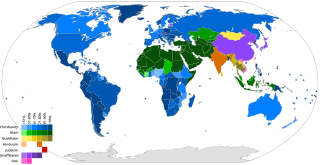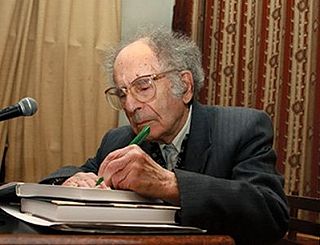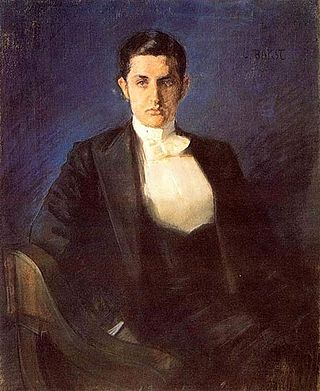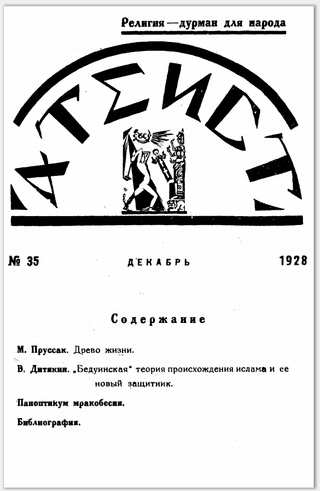
Fyodor Mikhailovich Dostoevsky, sometimes transliterated as Dostoyevsky, was a Russian novelist, short story writer, essayist and journalist. Numerous literary critics regard him as one of the greatest novelists in all of world literature, as many of his works are considered highly influential masterpieces.

A sect is a subgroup of a religious, political, or philosophical belief system, usually an offshoot of a larger group. Although the term was originally a classification for religious separated groups, it can now refer to any organization that breaks away from a larger one to follow a different set of rules and principles. Sects are usually created due to perception of heresy by the subgroup and/or the larger group.

Freethought is an epistemological viewpoint which holds that beliefs should not be formed on the basis of authority, tradition, revelation, or dogma, and should instead be reached by other methods such as logic, reason, and empirical observation.

Mikhail Mikhailovich Bakhtin was a Russian philosopher, literary critic and scholar who worked on literary theory, ethics, and the philosophy of language. His writings, on a variety of subjects, inspired scholars working in a number of different traditions and in disciplines as diverse as literary criticism, history, philosophy, sociology, anthropology and psychology. Although Bakhtin was active in the debates on aesthetics and literature that took place in the Soviet Union in the 1920s, his distinctive position did not become well known until he was rediscovered by Russian scholars in the 1960s.

Russian cosmism, also cosmism, is a later term for philosophical and cultural movement that emerged in Russia at the turn of the 19th century, and again, at the beginning of the 20th century. At the beginning of the 20th century, there was a burst of scientific investigation into interplanetary travel, largely driven by fiction writers such as Jules Verne and H. G. Wells as well as philosophical movements like the Russian cosmism.
Pavel Nikolaevich Medvedev was a Russian literary scholar. He was a professor, social activist, and friend of Mikhail Bakhtin, as well as of Boris Pasternak and Fyodor Sologub. Medvedev held several government posts in education and publishing after the 1917 revolution, publishing a great deal of his own writing on literary, sociological, and linguistic issues. Medvedev was arrested during the 1930s period of purges under the rule of Joseph Stalin, and "disappeared" shortly after his arrest. He was shot on 17 July 1938.

Zinaida Nikolayevna Gippius or Hippius was a Russian poet, playwright, novelist, editor and religious thinker, one of the major figures in Russian symbolism. The story of her marriage to Dmitry Merezhkovsky, which lasted 52 years, is described in her unfinished book Dmitry Merezhkovsky.

Boris Viktorovich Savinkov was a Russian writer and revolutionary. As one of the leaders of the SR Combat Organization, the paramilitary wing of the Socialist Revolutionary Party, Savinkov was involved in the assassinations of several high-ranking imperial officials in 1904 and 1905.

Dmitry Sergeyevich Merezhkovsky was a Russian novelist, poet, religious thinker, and literary critic. A seminal figure of the Silver Age of Russian Poetry, regarded as a co-founder of the Symbolist movement, Merezhkovsky – with his wife, the poet Zinaida Gippius – was twice forced into political exile. During his second exile (1918–1941) he continued publishing successful novels and gained recognition as a critic of the Soviet Union. Known both as a self-styled religious prophet with his own slant on apocalyptic Christianity, and as the author of philosophical historical novels which combined fervent idealism with literary innovation, Merezhkovsky became a nine-time nominee for the Nobel Prize in literature, which he came closest to winning in 1933. However, because he was close to the Nazis, he was virtually forgotten after World War 2.

Russian philosophy is a collective name for the philosophical heritage of Russian thinkers.
The question of whether Freemasonry is anticlerical is the subject of debate. The Catholic Church has long been an outspoken critic of Freemasonry, and some scholars have often accused the fraternity of anticlericalism. The Catholic Church forbids its members to join any Masonic society under pain of interdiction. Freemasons usually take a diametrically opposite view, stating that there is nothing in Freemasonry that is in any way contrary to Catholicism or any other religious faith.

Grigory Solomonovich Pomerants was a Russian philosopher and cultural theorist. He is the author of numerous philosophical works that circulated in samizdat and made an impact on the liberal intelligentsia in the 1960s and 1970s.

Dmitry Vladimirovich Filosofov was a Russian author, essayist, literary critic, religious thinker, newspaper editor and political activist, best known for his role in the influential early 1900s Mir Iskusstva circle and part of quasi-religious Troyebratstvo, along with two of his closest friends and spiritual allies, Dmitry Merezhkovsky and Zinaida Gippius.

Viktor Sergeyevich Mirolyubov was a Russian journalist, editor and publisher. Having started out as an opera singer, he became widely known for his work as a head of Zhurnal Dlya Vsekh, originally a minor publication which he then bought out to turn into one of the leading literary Russian magazines of the time. In 1901 Mirolyubov became a co-founder of the Religious-Philosophic Meetings (1901–1903).

The themes in the writings of Russian writer Fyodor Dostoevsky, which consist of novels, novellas, short stories, essays, epistolary novels, poetry, spy fiction and suspense, include suicide, poverty, human manipulation, and morality. Dostoevsky was deeply Eastern Orthodox and religious themes are found throughout his works, especially in those written after his release from prison in 1854. His early works emphasised realism and naturalism, as well as social issues such as the differences between the poor and the rich. Elements of gothic fiction, romanticism, and satire can be found in his writings. Dostoyevsky was "an explorer of ideas", greatly affected by the sociopolitical events which occurred during his lifetime. After his release from prison his writing style moved away from what Apollon Grigoryev called the "sentimental naturalism" of his earlier works and became more concerned with the dramatization of psychological and philosophical themes.

Pyotr Petrovich Pertsov was a Russian poet, publisher, editor, literary critic, journalist and memoirist associated with the Russian Symbolist movement.
Novy Put was a Russian religious, philosophical and literary magazine, founded in 1902 in Saint Petersburg by Dmitry Merezhkovsky and Zinaida Gippius. Initially a literary vehicle for the Religious and Philosophical Meetings, it was aiming to promote the so-called "Godseeking" doctrine through the artistic means of Russian Symbolism.
Natalie Duddington was a philosopher and a translator of Russian literature into English. Her first name sometimes appears as Nathalie.

Ateist was an antireligious monthly journal in Russian, which was published from 1922 to 1930 in the RSFSR and the USSR.













